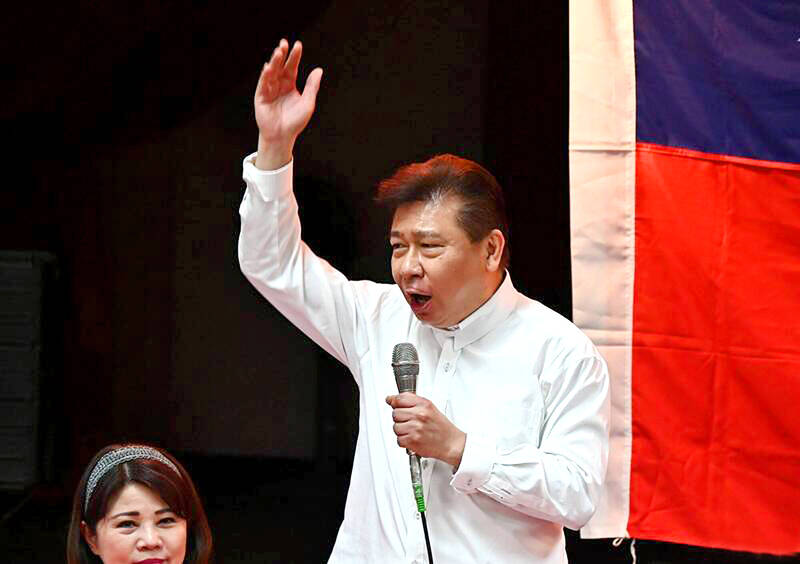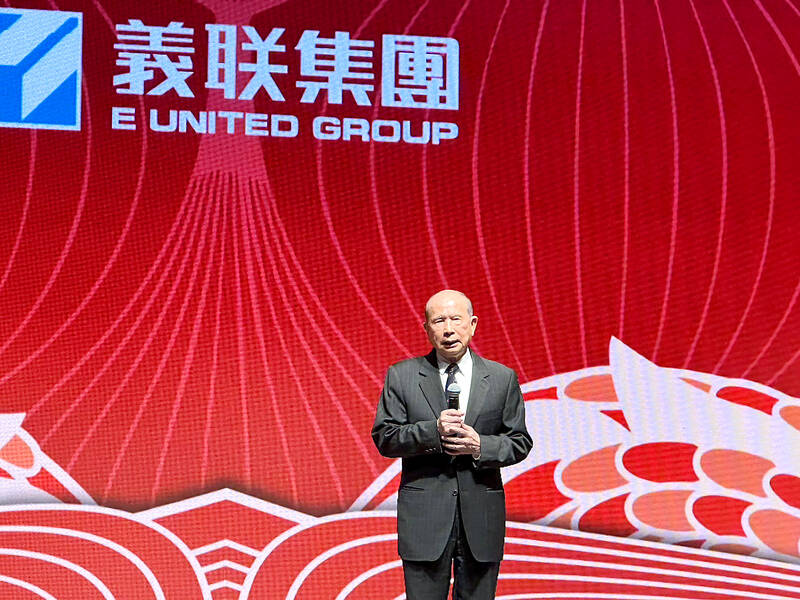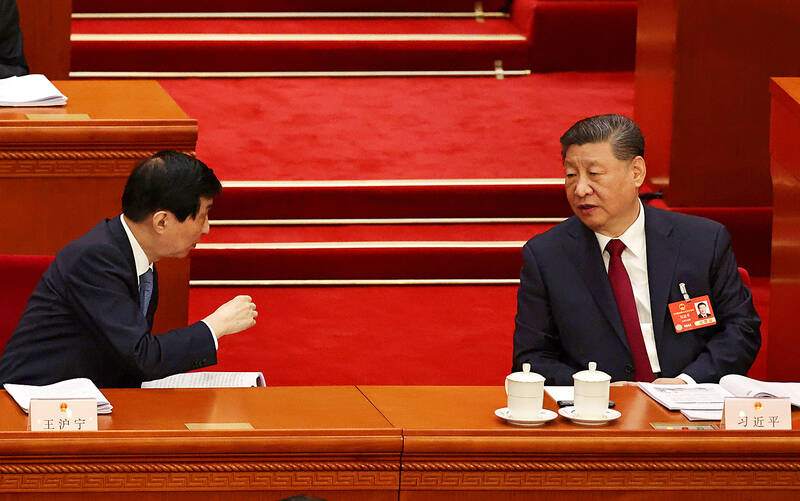A series of dramatic news items dropped last month that shed light on Chinese Communist Party (CCP) attitudes towards three candidates for last year’s presidential election: Taiwan People’s Party (TPP) founder Ko Wen-je (柯文哲), Terry Gou (郭台銘), founder of Hon Hai Precision Industry Co (鴻海精密), also known as Foxconn Technology Group (富士康科技集團), and New Taipei City Mayor Hou You-yi (侯友宜) of the Chinese Nationalist Party (KMT).
It also revealed deep blue support for Ko and Gou from inside the KMT, how they interacted with the CCP and alleged election interference involving NT$100 million (US$3.05 million) or more raised by the Chinese.
In spite of these bombshell revelations and the implication on Taiwan’s democracy it got surprisingly little coverage or follow-up, most likely because there has been so much going on in the news.

Photo: TT file photo
THE SUSPECTED SPY
On Feb. 11 Mirror Media released a screenshot of a social media message exchange between Ko and his campaign finance chief Lee Wen-tsung (李文宗) that took place Sept. 24 during the presidential campaign.
Lee — currently in jail indicted in the same corruption case involving Ko — had passed along the message, which included eight points, from former KMT legislator, former Mainland Affairs Council deputy minister Chang Hsien-yao (張顯耀).

Photo: Lin Ching-hua, Taipei Times
It was Chang who arranged the famous 2005 meeting between People First Party Chairman James Soong (宋楚瑜) and then CCP Secretary General Hu Jintao (胡錦濤).
Chang was also in the delegation on the Cross-Strait Service Trade Agreement with China that ended up being blocked by the 2014 Sunflower movement that saw the legislature occupied for a month by protesters. The KMT eventually backed down.
Chang was suspected of handing over secret documents to the Chinese during the negotiations and was placed under house arrest and investigated. The charges were eventually dropped, though a United Daily News report suggested that the Ministry of Justice suspected China of recruiting him as a spy. No charges were filed.

Photo: EPA-EFE
One of the leaders of the Sunflower movement was current TPP Chairman Huang Kuo-chang (黃國昌),while Ko attended the protests in support.
These are very unusual bedfellows.
DANGEROUS MAN
The message noted that Chang was “acting on behalf of [E-United Group] founder Lin Yi-shou (林義守).” Lin is a property developer in southern Taiwan of hotels, an outlet mall, theme parks and other developments, usually named “E-DA.”
He was also an official government policy advisor during the Ma Ying-jeou (馬英九) administration.
The first of the numbered points in Lee’s message to Ko was: “Chang Hsien-yao has traveled to mainland China and met with key high-level figures confirming that the mainland holds a positive view of Chairman Ko.”
Prosecutors last month confirmed that Chang met with China’s Taiwan Affairs Office (TAO) Director Song Tao (宋濤) and Wang Huning (王滬寧), now Chinese People’s Political Consultative Conference chairman.
Wang is often referred to as the most dangerous man in the world. He has been the primary ideological thinker for three Chinese leaders in a row, and is also second in command after Xi Jinping (習近平) at the Central Leading Group for Taiwan Affairs.
Wang also heads the United Front Work Department (UFWD), which actively works to subvert Taiwan’s society and democracy. Essentially it is Wang who is in charge of plotting how to annex Taiwan into the Chinese empire.
Point two was: “The mainland also views positively the support of founder Lin Yi-shou for Chairman Ko Wen-je.”
Lin sent Chang to Beijing to ensure Wang’s approval for them to go ahead and support Ko, which Wang did.
Let that sink in.
KMT CONSPIRACY
Points three and four are that Chang had met with Terry Gou twice to try and get him to join the Ko ticket, and that Gou “will make an important announcement in late September or early October” last year.
I am unsure what that announcement was, or if Chang was wrong or Gou changed his mind and it never happened.
However, on Oct. 11 last year Taiwan’s Mainland Affairs Council (MAC) announced that four Foxconn workers had been detained in China allegedly for breach of trust.
“The circumstances surrounding this case are quite strange,” the council said at the time.
Then on Oct. 22, Chinese state media reported that Foxconn subsidiaries were being investigated and audited.
It is highly unlikely these were accidents, but whether it was to pressure Gou to join a Ko-Gou ticket or to get out of the race is not entirely clear. That Gou eventually dropped out suggests that may have been their desire.
The next two points were: “The [Chinese Nationalist Party] (KMT) is more complicated, and the possibility of a Ko-Hou ticket is very low” and “There are party figures already making moves to pressure Hou to drop out of the presidential race.”
This suggests that Wang Huning and the powers in Zhongnanhai did not trust Hou, and it is especially noteworthy that Chang — a high ranking KMT party official — was actively conspiring against his own party’s candidate. They probably did not trust Hou because he is a native Taiwanese Hoklo (more commonly known as Taiwanese) speaker and they feared he would be another Lee Tung-hui (李登輝).
Point seven was: “Assistance in fundraising over NT$100 million.” Though he does not specify, if it was Chinese money such a large sum would be hard to bring in without attracting attention. I suspect that the Chinese would pressure companies in Taiwan with Chinese operations to raise the money inside Taiwan, then reward their subsidiaries in China.
The final point was that Chang was interested in a party list legislative seat. That would have been politically difficult for the TPP considering his past, but then NT$100 million buys a lot.
CHANG CHARGED
After reading Lee’s eight points, Ko replied “received.” He followed this up with “please delete the message to avoid it being recorded” and “on this side I will also delete it,” to which Lee replied “already deleted.”
Only one day after Mirror Media’s report, it was confirmed. The Kaohsiung Ciaotou District Prosecutors’ Office announced that after more than a year of investigation, they were pressing charges against Chang for allegedly contravening the Anti-Infiltration Act (反滲透法) and the Presidential and Vice Presidential Election and Recall Act (總統副總統選舉罷免法) for his actions.
There are still many unanswered questions that may be answered during the trial.
The biggest are about how much Ko was behind this and how much of the TPP leadership was involved.
How much was or is current TPP Chairman Huang Kuo-chang in the know?
Also, how close was Chang to Beijing exactly? This was not his only trip there that year.
Regardless, that this had penetrated Ko’s inner circle and he was aware of their actions and either did nothing about it or encouraged it, is already highly concerning.
Donovan’s Deep Dives is a regular column by Courtney Donovan Smith (石東文) who writes in-depth analysis on everything about Taiwan’s political scene and geopolitics. Donovan is also the central Taiwan correspondent at ICRT FM100 Radio News, co-publisher of Compass Magazine, co-founder Taiwan Report (report.tw) and former chair of the Taichung American Chamber of Commerce. Follow him on X: @donovan_smith.

March 2 to March 8 Gunfire rang out along the shore of the frontline island of Lieyu (烈嶼) on a foggy afternoon on March 7, 1987. By the time it was over, about 20 unarmed Vietnamese refugees — men, women, elderly and children — were dead. They were hastily buried, followed by decades of silence. Months later, opposition politicians and journalists tried to uncover what had happened, but conflicting accounts only deepened the confusion. One version suggested that government troops had mistakenly killed their own operatives attempting to return home from Vietnam. The military maintained that the

Taiwan has next to no political engagement in Myanmar, either with the ruling military junta nor the dozens of armed groups who’ve in the last five years taken over around two-thirds of the nation’s territory in a sprawling, patchwork civil war. But early last month, the leader of one relatively minor Burmese revolutionary faction, General Nerdah Bomya, who is also an alleged war criminal, made a low key visit to Taipei, where he met with a member of President William Lai’s (賴清德) staff, a retired Taiwanese military official and several academics. “I feel like Taiwan is a good example of

Jacques Poissant’s suffering stopped the day he asked his daughter if it would be “cowardly to ask to be helped to die.” The retired Canadian insurance adviser was 93, and “was wasting away” after a long battle with prostate cancer. “He no longer had any zest for life,” Josee Poissant said. Last year her mother made the same choice at 96 when she realized she would not be getting out of hospital. She died surrounded by her children and their partners listening to the music she loved. “She was at peace. She sang until she went to sleep.” Josee Poissant remembers it as a beautiful

Before the last section of the round-the-island railway was electrified, one old blue train still chugged back and forth between Pingtung County’s Fangliao (枋寮) and Taitung (台東) stations once a day. It was so slow, was so hot (it had no air conditioning) and covered such a short distance, that the low fare still failed to attract many riders. This relic of the past was finally retired when the South Link Line was fully electrified on Dec. 23, 2020. A wave of nostalgia surrounded the termination of the Ordinary Train service, as these train carriages had been in use for decades